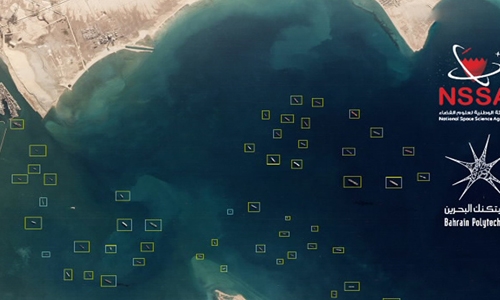Bahrain Polytechnic student develops unique project to detect and monitor oil spills from naval vessels
TDT | Manama
The Daily Tribune – www.newsofbahrain.com
A student from Bahrain Polytechnic has developed an electronic application to protect marine life with the help of the Space Authority (NSSA) and Bahrain Polytechnic. Information and Communications Technology (ICT) student Mohammed Jamal was hosted by NSSA for three months to implement his graduation project in space science.
It was under the supervision of space data analyst Shaima Al Meer from the agency, and Dr Sini Raj from the Bahrain Polytechnic as part of a memorandum of understanding signed by them.
The app aims to detect and monitor oil spills from naval vessels using images and data received from satellites specialised in remote sensing. It is designed with algorithms based on the principles of artificial intelligence. NSSA has also completed several projects that support efforts to preserve the marine environment and its natural wealth, thus contributing to preserving the Kingdom’s food security. The efforts exerted in implementing Mohammed’s project were hailed with great success.
The accuracy of the application has reached 98% as a result of the high-resolution satellite data and images provided by the agency from more than one source.
About this achievement, Al Meer said: “We are pleased with the achievement of Mohammed. The accuracy rate that the application has reached is very high, and it is in line with international standards in this field.”
Al Meer noted that the ideal accuracy rate for artificial intelligence applications of this type is within 85%. Al Meer added: “We were not surprised that Mohammed would complete this project in a relatively record time and with this level of accuracy because we all know that Bahrain Polytechnic students have been exceptionally qualified, armed with modern knowledge and 21st-century skills, and have been enabled to view the latest technologies. They are also trained to adapt to different work environments.”
Al Meer said that Mohammed had received several job offers because of his academic excellence and his achievement of this project, before graduating from the Polytechnic. “This comes within a series of projects that the National Space Science Agency seeks to implement within its current strategic plan. The ship-monitoring project is unique and one of the latest projects presented by the agency because ships play a major role in the occurrence of oil spills,” Al Meer pointed out.
The President of the College of Information and Communication Technology at Bahrain Polytechnic, Dr Christos Gazzolis, said: “We are very pleased with Mohammed Jamal, who conducted this successful project at NSSA. Mohammed has been able to make use of the ICT skills he acquired at Polytechnic and implement them in the work environment.”
One of the most important objectives of the NSSA is to build national capabilities in the fields of space science, including remote sensing and artificial intelligence applications, to contribute to achieving comprehensive and sustainable development, and highlight its benefits in many areas such as agriculture, urban planning, and natural resource management, marine and coastal monitoring, disaster management, environmental protection among others.
Related Posts

